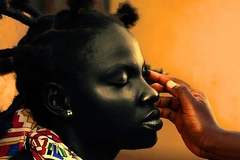Nigeria confronts cosmetic safety gaps as demand outpaces controls
Key takeaways
- Nigeria is tightening cosmetic-safety oversight as unsafe products continue to enter markets.
- Experts say weak coordination between agencies has stalled enforcement and delayed reforms.
- The country’s booming beauty market is increasing pressure to strengthen testing and regulation.

Nigeria’s regulators and laboratory experts are tightening oversight of the country’s cosmetics industry, as weak national safety controls are exposing millions of consumers to health risks. The move comes as West Africa’s beauty and personal care industry sees rapid growth, making safety a top priority.
The Beauty West Africa Expo commenced yesterday, November 27, in Lagos. Organizers cite data showing the beauty and personal care market in Africa is projected to reach US$69.53 billion in 2025. They attribute the growth to urbanization, a youthful population, and rising disposable incomes.
The exhibition organizers describe Nigeria as a central gateway to this growth, especially as local and international brands use Lagos as a hub to reach consumers across West Africa and the wider sub-Saharan region.
The expo coincides with the Institute of Public Analysts of Nigeria’s (IPAN) 32nd Mandatory Continuous Professional Development Workshop in Lagos. At this month’s event, scientists, regulators, and industry stakeholders have urged the federal government to address what they describe as “dangerous gaps” in the country’s cosmetic safety system.
“The influx of substandard, adulterated, or improperly tested cosmetic products poses clear risks to consumer health and public safety. Our role as public analysts has never been more crucial,” IPAN registrar and CEO Aliyu Abdullah Angara warns.
Growth outpaces safety
Experts at the workshop say counterfeit and adulterated cosmetics continue to find their way into shops and informal markets, despite existing bans and regulations.
These products can cause chemical burns on the skin, disrupt hormones, introduce toxic chemicals into the bloodstream, cause chronic illnesses, and could result in long-term systemic health complications, according to the speakers.
Moreover, event attendees argue that Nigeria’s current cosmetics safety systems have lagged behind the industry’s growth.
They warn that overlapping mandates and weak coordination between government agencies allow counterfeiters and unsafe producers to exploit loopholes in Nigeria’s regulatory framework.
In response to these concerns, workshop stakeholders call for a tightening of Nigeria’s cosmetic safety architecture. The reform includes clearer roles for agencies, better enforcement, and stronger laboratory governance.
Regulators and experts place particular emphasis on the need to restore IPAN’s dissolved governing council. The council has been absent for almost three years, despite being seen as critical to national quality infrastructure.
.webp) Many cosmetics sold in informal markets come from unregulated, makeshift production sites.Former council chairman and former president of the Society of Testing Laboratory Analysts of Nigeria, professor Olugbenga Ogunmoyela, argues that the council’s absence has stalled essential regulatory decisions.
Many cosmetics sold in informal markets come from unregulated, makeshift production sites.Former council chairman and former president of the Society of Testing Laboratory Analysts of Nigeria, professor Olugbenga Ogunmoyela, argues that the council’s absence has stalled essential regulatory decisions.
“Two years, three years is long enough to have kept this council out,” Ogunmoyela says. “Critical issues have stalled. It is time that the council was brought back and reconstituted to ensure the law is upheld.”
No board, no progress
Nigeria’s regulatory ecosystem for cosmetics involves the collaboration of multiple agencies, but experts at the IPAN workshop have stressed that the system suffers from fragmentation and overlapping mandates. This fragmentation leads to weaker cosmetics oversight, and thereby, compromised public safety.
“Our nation cannot afford duplication of mandates or inter-agency rivalry,” Angara says, urging regulators to pursue coordination rather than competition.
A central demand at the workshop is the reinstatement of IPAN’s governing council.
The council was dissolved after President Tinubu ordered a blanket dismissal of all governing boards of all federal agencies and parastatals in June 2023. Agencies that were left board-less were “directed to refer matters requiring the attention of their boards to the president.”
Ogunmoyela argues that the board’s dismissal has stalled decisions on cosmetics safety enforcement strategies.
He links the absence of the council to a slowdown in collaborations, such as laboratory training programs for the National Drug Law Enforcement Agency. These training programs would support enforcement against illicit cosmetic products.
Ogunmoyela praises IPAN’s management for keeping basic operations running, but warns that the institute cannot indefinitely function without a governing council.
“The management of IPAN has tried its best to keep things going, but it is time for the council to be brought back,” he says.
.webp) Younger consumers are driving growth as beauty spending rises across Gen Z and millennials.Tip and trace
Younger consumers are driving growth as beauty spending rises across Gen Z and millennials.Tip and trace
IPAN-accredited facilities currently conduct toxicity testing, ingredient verification, heavy-metal analysis, and microbial safety screening for cosmetic products. The tests are carried out in university labs, research centers, and private facilities. Together, these efforts form the backbone of Nigeria’s cosmetic-testing ecosystem.
Professor Taiwo Asekun, dean of the Faculty of Science at the University of Lagos, emphasizes that scientific testing must guide the industry.
Addressing cosmetics manufacturers and companies, Asekun says: “For your cosmetic products to be accepted, you must do things right from the beginning.”
She warns that counterfeit and unregulated cosmetic products are becoming increasingly common, despite posing serious health risks to unsuspecting consumers.
Asekun urges cosmetics manufacturers to adhere to national product standards, comply with Nigeria’s National Agency for Food and Drug Administration and Control (NAFDAC) approval processes, and rely on IPAN-certified labs to mitigate these health risks.
She emphasizes that companies must verify their claims, test for toxic heavy metals, and screen for microbial contamination to ensure that every formulation is safe.
However, Asekun explains a key challenge in enforcing product safety in Nigeria stems from the products’ informal origins.
She notes that many counterfeit and unsafe cosmetic products originate from residential-based, makeshift operations. These operations, often referred to as “cottage industry mixing,” are difficult for regulators to trace without tip-offs.
The university dean stresses that NAFDAC is working to reach “all nooks and crannies,” but citizen reports remain essential to identifying illegal manufacturers.
She encourages Nigerians to “say something when they see something wrong” and frames public vigilance as a critical layer of surveillance.
Asekun expresses confidence in Nigeria’s pool of technical talent, arguing that the challenge is not a lack of expertise, but rather better integrating IPAN experts into testing systems.
“We have more than enough people in IPAN.”













